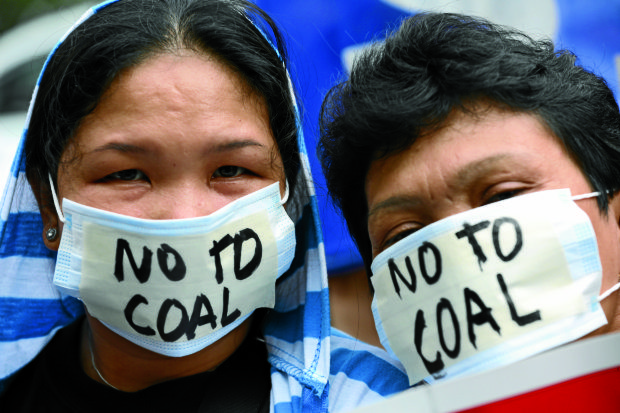
Climate justice, environmental and health grougs organized a mass action in front of Department of Environment and Natural Resources Main Office, Quezon City, January 11, 2017, together with the coal ash affected communities from Limay, Bataan, the group also want to shut down coal plants.
INQUIRER PHOTO / NINO JESUS ORBETA
The World Health Organization (WHO) said that countries planning to build more coal-fired plants should consider the negative effects of burning fossil fuels on public health.
Dr. Diarmid Campbell-Lendrum, head of climate change and health team of the WHO, said that while supplying electricity to communities has positive effects on health, governments must also consider the pollution that comes from ‘dirty energy sources.
“We know that in many parts of the world, a significant portion of air pollution comes from coal,” he said.
The Philippines is set to build at least 25 more coal-fired plants, amid stranded assets risk due to coal technology becoming obsolete and significant reduction in renewable energy products.
It continues to rely on coal for energy, despite having ratified the Paris Agreement. Burning coal is the biggest single source of carbon dioxide emissions from human activity, according to Greenpeace International.
The Paris Agreement is the first global climate treaty that seeks to address climate change by cutting carbon emissions to keep rising global temperatures to 2˚C.
According to the WHO, around 6.5 million people die every year due to air pollution. Inhaling polluted air regularly increases one’s risk of contracting cardiovascular and respiratory diseases, which could lead to paralysis or death.
In a study by Greenpeace Southeast Asia in 2016, it said that there have been 960 premature deaths due to strokes, cardiovascular and respiratory diseases linked to coal-related pollution in the country. The number will likely rise to 2,410, following the construction of more coal-powered plants.
In a statement last September, the Department of Health and Department of Environment and Natural Resources said that air pollution is a public health concern for the country.
However, the government has not addressed air quality problems of the country, especially in places where coal-fired plants are located.